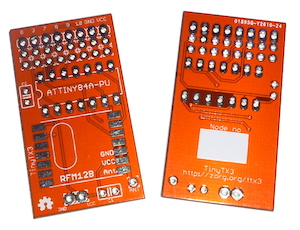I created a GitHub repository for RFM69_LPL versions of TinyTx firmware sketches. The original JeeLib-based firmware sketches and the ATtiny84-based TinyTx board were created for the OpenEnergyMonitor ecosystem by Nathan Chantrell.

So far I’ve completed the TinyTx_DS18B20 temperature node sketch. It gives a good starting point for anyone wanting to work with a TinyTx board and communicate with the new RFM69 LPL radio format.
Here is that sketch.
/* TinyTx_DS18B20_LPL
* TinyTx Temp Sensor with RFM69_LPL radio library
* Brandon Baldock August 2023
*
* This is the original TinyTx sketch by Nathan Chantrell, modified to work with the OpenEnergyMonitor fork of the
* RFM69 libarary from Felix Rusu of LowPowerLab. //https://github.com/openenergymonitor/RFM69_LPL
*
* I used the OpenEnergyMonitor default encryption key (89txbe4p8aik5kt3) and network (210).
* I changed the ACK_TIME definition to the RFM69 default "retryWaitTime" of 30 (originally 10).
* I changed the RETRY_LIMIT definition to the RFM69 "retries" default of 2 (originally 5).
* I removed the RETRY_PERIOD definition. How soon to retry is not user-defined in RFM69.
* I removed the waitForAck() function because this is handled in RFM69 by sendWithRetry.
*
* Use Spence Konde's ATTinyCore to compile the firmware.
* I switched to the ATTinyCore pin notation (using "PIN_PA0" rather than "10", for example) to reduce confusion.
* I have tried to leave everything else untouched.
*/
//----------------------------------------------------------------------------------------------------------------------
// TinyTX - An ATtiny84 and RFM12B Wireless Temperature Sensor Node
// By Nathan Chantrell. For hardware design see http://nathan.chantrell.net/tinytx
//
// Using the Dallas DS18B20 temperature sensor
//
// Licenced under the Creative Commons Attribution-ShareAlike 3.0 Unported (CC BY-SA 3.0) licence:
// http://creativecommons.org/licenses/by-sa/3.0/
//
// Requires Arduino IDE with arduino-tiny core: http://code.google.com/p/arduino-tiny/
// and small change to OneWire library, see: http://arduino.cc/forum/index.php/topic,91491.msg687523.html#msg687523
//----------------------------------------------------------------------------------------------------------------------
#include <OneWire.h> // http://www.pjrc.com/teensy/arduino_libraries/OneWire.zip
#include <DallasTemperature.h> // http://download.milesburton.com/Arduino/MaximTemperature/DallasTemperature_LATEST.zip
#include <JeeLib.h> // https://github.com/openenergymonitor/RFM69_LPL
#include <RFM69_LPL.h> //https://github.com/openenergymonitor/RFM69_LPL
RFM69 radio;
ISR(WDT_vect) { Sleepy::watchdogEvent(); } // interrupt handler for JeeLabs Sleepy power saving
#define myNodeID 1 // RF12 node ID in the range 1-30
#define network 210 // RF12 Network group
#define freq RF12_433MHZ // Frequency of RFM12B module
#define ENCRYPTKEY "89txbe4p8aik5kt3" //OpenEnergyMonitor sample encrypt key is 89txbe4p8aik5kt3
#define USE_ACK // Enable ACKs, comment out to disable
#define RETRY_LIMIT 2 // Maximum number of times to retry
#define ACK_TIME 30 // Number of milliseconds to wait for an ack
#define ONE_WIRE_BUS PIN_PA0 // DS18B20 Temperature sensor is connected on D10/ATtiny pin 13
#define ONE_WIRE_POWER PIN_PA1 // DS18B20 Power pin is connected on D9/ATtiny pin 12
OneWire oneWire(ONE_WIRE_BUS); // Setup a oneWire instance
DallasTemperature sensors(&oneWire); // Pass our oneWire reference to Dallas Temperature
//########################################################################################################################
//Data Structure to be sent
//########################################################################################################################
typedef struct {
int temp; // Temperature reading
int supplyV; // Supply voltage
} Payload;
Payload tinytx;
//--------------------------------------------------------------------------------------------------
// Send payload data via RF
//-------------------------------------------------------------------------------------------------
static void rfwrite(){
#ifdef USE_ACK
//sendWithRetry(uint16_t toAddress, const void* buffer, uint8_t bufferSize, uint8_t retries=2, uint8_t retryWaitTime=RFM69_ACK_TIMEOUT);
radio.sendWithRetry(0, (const void*)(&tinytx), sizeof(tinytx), RETRY_LIMIT, ACK_TIME);
radio.sleep(); // Put RF module to sleep
return;
#else
radio.send(0, (const void*)(&tinytx), sizeof(tinytx), false);
radio.sleep(); // Put RF module to sleep
return;
#endif
}
//--------------------------------------------------------------------------------------------------
// Read current supply voltage
//--------------------------------------------------------------------------------------------------
long readVcc() {
bitClear(PRR, PRADC); ADCSRA |= bit(ADEN); // Enable the ADC
long result;
// Read 1.1V reference against Vcc
#if defined(__AVR_ATtiny84__)
ADMUX = _BV(MUX5) | _BV(MUX0); // For ATtiny84
#else
ADMUX = _BV(REFS0) | _BV(MUX3) | _BV(MUX2) | _BV(MUX1); // For ATmega328
#endif
delay(2); // Wait for Vref to settle
ADCSRA |= _BV(ADSC); // Convert
while (bit_is_set(ADCSRA,ADSC));
result = ADCL;
result |= ADCH<<8;
result = 1126400L / result; // Back-calculate Vcc in mV
ADCSRA &= ~ bit(ADEN); bitSet(PRR, PRADC); // Disable the ADC to save power
return result;
}
//########################################################################################################################
void setup() {
radio.setPins(PIN_PB1,PIN_PA5,PIN_PA6,PIN_PA4); // (SSpin, MOSIpin, MISOpin, SCKpin)
radio.initialize(freq,myNodeID,network); // Initialize RFM12 with settings defined above
radio.encrypt(ENCRYPTKEY);
radio.sleep(); // Put the RFM12 to sleep
pinMode(ONE_WIRE_POWER, OUTPUT); // set power pin for DS18B20 to output
PRR = bit(PRTIM1); // only keep timer 0 going
ADCSRA &= ~ bit(ADEN); bitSet(PRR, PRADC); // Disable the ADC to save power
}
void loop() {
digitalWrite(ONE_WIRE_POWER, HIGH); // turn DS18B20 sensor on
//Sleepy::loseSomeTime(5); // Allow 5ms for the sensor to be ready
delay(5); // The above doesn't seem to work for everyone (why?)
sensors.begin(); //start up temp sensor
sensors.requestTemperatures(); // Get the temperature
tinytx.temp=(sensors.getTempCByIndex(0)*100); // Read first sensor and convert to integer, reversed at receiving end
digitalWrite(ONE_WIRE_POWER, LOW); // turn DS18B20 off
tinytx.supplyV = readVcc(); // Get supply voltage
rfwrite(); // Send data via RF
Sleepy::loseSomeTime(60000); //JeeLabs power save function: enter low power mode for 60 seconds (valid range 16-65000 ms)
}